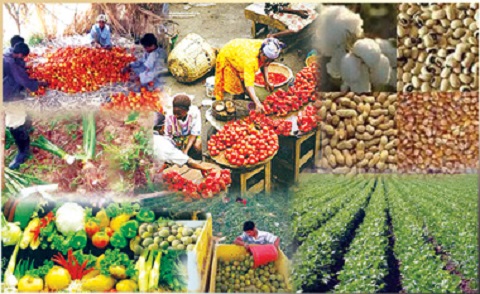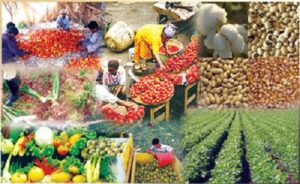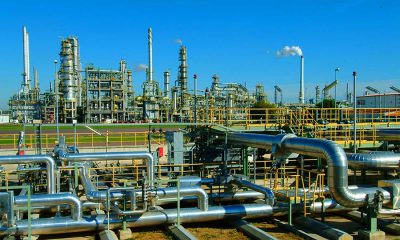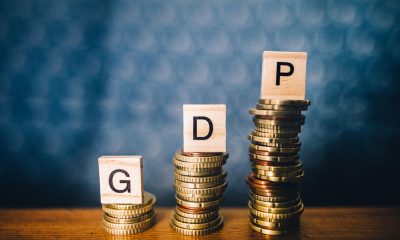Economy
Nigeria’s Non-Oil Economy Records Slight Growth


**As FG Policies Sustain Rising GDP Figures In Agric, Solid Minerals Sectors
By Modupe Gbadeyanka
Third Quarter GDP figures released by the National Bureau of Statistics (NBS) has revealed a consistent growth in Agric and Solid Mineral sectors, indicating the success of the Buhari administration’s economic policies even though overall economy is still in recession.
The over-riding impact of the oil and gas sector, where vandalism and sabotage of critical installations negatively affected production output, explains the persistence of the recession, as the non-oil economy posted a very slight growth.
However, efforts to resolve the Niger Delta situation are continuing as the Federal Government has opened several channels of communication with all relevant groups in the Niger Delta.
Also, urgent fiscal and monetary measures to spur the economy back to overall positive territory are certainly in the offing including those targeting manufacturing.
According to Special Adviser to the President on Economic Matters, Dr Adeyemi Dipeolu on the latest NBS reports, “The third quarter results just released by the National Bureau of Statistics show that the Nigerian economy is still in recession.
“Growth in Gross Domestic Product fell by -2.24% in the third quarter as compared to the decline of -2.07 percent experienced in the second quarter.
“The slight deterioration in national economic performance owes largely to the continued poor performance of the oil and gas sector which worsened to -22.01% in the third quarter as compared to -17.48% in the second quarter of 2016. The immediate cause of this, as is now generally recognised, is the steep decline in oil and gas production in the third quarter of 2016 due to acts of vandalism and sabotage of oil export facilities.”
He said remote causes include the continued outsized influence of the oil and gas sector on the rest of the economy as typified by its contribution to government revenue and foreign exchange earnings, which continue to be important motors of economic activity.
According to him, due to time lags, it is still too early for policy interventions of the Federal Government to begin to impact fully on economic activity.
There are however some ‘green shoots’ of economic recovery beginning to emerge.
To start with, on-going consultations to bring lasting peace to the Niger Delta have enabled an increase in oil and gas production which if sustained at current prices, will bring a measure of relief to the economy.
Other key sectors of the economy showed encouraging signs of improvement.
The growth in the non-oil economy although still weak at 0.03% showed a return to positive territory after two consecutive quarters of negative growth. This was partly due to the continued good performance of agriculture and the solid minerals, two sectors prioritised by the Federal Government.
Agriculture grew by 4.54% in the quarter under consideration of which growth in crop production at nearly 5% was at its highest since the first quarter of 2014. Growth in the solid mineral sector averaged about 7%.
The financial sector rebounded quite strongly in the period under review growing by 2.85% from a negative growth of -13.24% in the second quarter. The recently approved first tranche of $600m to be borrowed from the African Development Bank will also provide some relief in budgetary terms and supplement capital inflows. Indeed, there was a slight uptick of capital inflows into the economy in the third quarter of 2016. Overall capital inflows in the third quarter of 2016 increased by 74.84% over the second quarter.
The performance of the manufacturing sector continued to be of concern given its key role in value addition and job creation in the economy. It is expected however that with greater local sourcing of raw materials, expected improvements in infrastructure, especially power and reductions in the cost of doing business, this sector will soon experience a sustained improvement in its contribution to the national economy.
Similarly, while inflation is still high at 18.3% on a year-on-year basis it has begun to level out on a month-on-month basis and should enable the deployment of more policy tools to support growth and employment. Indeed, growth of headline inflation slowed down appreciably from 13.8% in May to as low as 1.70% in September.
The year to date growth is about -1.58% and is set to improve given some of the points mentioned earlier especially regarding agriculture, oil and gas, and power supply. In addition, there have also been reductions in the rate of contraction of household and government consumption expenditure. Household consumption expenditure fell for instance by -3.25% in the third quarter of 2016 as compared to -6.0% recorded in the second quarter.
The ratio of investment to GDP also showed a notable improvement rising by 7.6% in the third quarter of 2016 as compared to a contraction of -7.4% in the fourth quarter of 2015.
The Strategic Implementation Plan for the implementation of the 2016 Budget of Change prioritised capital expenditures for power, roads and rail as well as social investments. In addition to creating jobs and promoting social inclusion, these expenditures will also provide a stimulus by putting money in the hands of people. The usual economic activity that takes place in the Yuletide season will also likely have a positive impact on the wholesale and retail trade sector.
Overall therefore, it is expected that these factors which will be underpinned by the policies to be unveiled in the Economic Recovery and Growth Plan, ERGP, to be adopted before the end of the year, will lend further momentum to on-going efforts to revitalise and reposition the economy.”
Economy
FG Targets Credit Access For 50% Workers By 2030

By Adedapo Adesanya
The Vice President, Mr Kashim Shettima, inaugurated the Board of the Nigerian Consumer Credit Corporation (CREDICORP) and gave a 50 per cent access target for workers, saying consumer credit was critical to Nigeria’s ambition of becoming a one-trillion-dollar economy by 2030.
According to him, President Bola Tinubu established the CREDICORP to build a trusted credit infrastructure, provide catalytic capital to lower borrowing costs, and help Nigerians overcome long-standing cultural resistance to credit.
Speaking on Thursday in Abuja when he inaugurated the board on behalf of the President, the Vice President, in a statement by his spokesman, Mr Stanley Nkwocha, said that the quality of life of Nigerians cannot improve without closing the gap between access to capital and human dignity.
“A civil servant who earns honestly does not have to chase sudden wealth just to buy a vehicle, or save for ten years to buy one. A young professional should not remain in darkness simply because solar power must be paid for all at once,” the Vice President said.
VP Shettima disclosed that in just one year of operations, CREDICORP has disbursed over ₦37 billion in consumer credit to more than 200,000 Nigerians, with over half of them accessing formal credit for the first time.
The Vice President said the organisation was specifically tasked with building credit infrastructure to bridge the trust gap between lenders and borrowers, providing wholesale capital and credit guarantees through its portfolio company.
“Ultimately, these critical jobs of CREDICORP will enable access to consumer credit to at least 50 per cent of working Nigerians by 2030,” he said.
The Vice President explained that the new board’s role was not ceremonial as they are custodians of the organisation’s mission, adding that the long-term strength of the institution would depend on their “vigilance, integrity, sacrifice, and commitment.”
He directed Board members to uphold Public Service Rules, the Board Charter, and all applicable governance frameworks, warning that accountability and stewardship of public resources were non-negotiable.
The Chairman of CREDICORP, Mr Aderemi Abdul, expressed appreciation to President Tinubu for his vision behind the formation of CREDICORP and for the confidence reposed in them, noting that the establishment of the corporation marked an important step towards strengthening the nation’s financial architecture.
He assured President Tinubu that the board understands its responsibility and will guide the institution to deliver meaningful benefits to Nigerians.
For his part, Mr Uzoma Nwagba, Managing Director/CEO of CREDICORP, recalled watching President Tinubu say 20 years ago that consumer credit is one of the major tools that will improve the lives of Nigerians.
He noted that over the past 18 months, the institution has benefited more than 200,000 Nigerians, including students.
He assured that the presidential vision behind CREDICORP would not be taken lightly, as the team considers their appointments a unique, once-in-a-lifetime opportunity.
Other members of the board inaugurated include Mrs Olanike Kolawole, Executive Director, Operations; Mrs Aisha Abdullahi, Executive Director, Credit and Portfolio Management; Mr Armstrong Ume-Takang (MD, MoFI), Representative of MoFI; Mrs Bisoye Coke-Odusote (DG, NIMC), Representative of NIMC; and Mr Mohammed Naziru Abbas, Representative of FMITI.
Others are Mr Marvin Nadah, Representative of FCCPC; Mrs Chinonyelum Ndidi, Representative of the Federal Ministry of Finance; Mr Mohammed Abbas Jega, Independent Director; and Mrs Toyin Adeniji, Independent Director.
Economy
NASD OTC Exchange Rallies 0.23% as Nipco Leads Six Advancers

By Adedapo Adesanya
Six price gainers helped the NASD Over-the-Counter (OTC) Securities Exchange retain its stay in green territory after a 0.23 per cent appreciation on Thursday, February 26.
The price gainers were led by Nipco Plc, which added N25.00 to close at N278.00 per share compared with the previous day’s N253.00 per share, NASD Plc rose by N5.13 to N56.41 per unit versus N51.28 per unit, FrieslandCampina Wamco Nigeria Plc expanded by N2.24 to N102.44 per share from N100.00 per share, Afriland Properties Plc grew by 88 Kobo to N18.88 per unit from N18.00 per unit, 11 Plc increased by 35 Kobo to N277.00 per share from N276.65 per share, and Lagos Building Investment Company (LBIC) Plc gained 27 Kobo to close at N3.75 per unit versus N3.48 per unit.
On the flip side, Central Securities Clearing System (CSCS) Plc lost N1.75 to sell at N68.25 per share versus N70.00 per share, and Geo-Fluids Plc depreciated by 2 Kobo to N3.25 per unit from N3.27 per unit.
The weight of the advancers fortified the NASD Unlisted Security Index (NSI) by 9.21 points to 4,034.46 points from 4,025.25 points, and the market capitalisation soared by N5.51 billion to N2.413 trillion from Wednesday’s N2.408 trillion.
Yesterday, the transaction value jumped by 18.8 per cent to N102.8 million from N80.7 million, and the number of deals surged by 18,8 per cent to 38 deals from 32 deals, while the transaction volume went down by 84.9 per cent to 1.3 million units from 8.7 million units.
At the close of business, CSCS Plc was the most traded stock by value (year-to-date) with 34.2 million units worth N2.04 billion, followed by Okitipupa Plc with 6.3 million units sold for N1.1 billion, and Geo-Fluids Plc with 122.1 million units valued at N478.2 million.
Resourcery Plc remained as the most traded stock by volume (year-to-date) with 1.05 billion units exchanged for N408.7 million, trailed by Geo-Fluids Plc with 122.1 million worth N478.2 million, and CSCS Plc with 34.2 million units traded for N2.04 billion.
Economy
Naira Down Again at NAFEX, Trades N1,359/$1

By Adedapo Adesanya
The Naira further weakened against the Dollar in the Nigerian Autonomous Foreign Exchange Market (NAFEX) for the fourth straight session this week on Thursday, February 26.
At the official market yesterday, the Nigerian Naira lost N3.71 or 0.27 per cent to trade at N1,359.82/$1 compared with the previous session’s N1,356.11/$1.
In the same vein, the local currency depreciated against the Pound Sterling in the same market window on Thursday by N8.27 to close at N1,843.23/£1 versus Wednesday’s closing price of N1,834.96/£1, and against the Euro, it crashed by N8.30 to quote at N1,606.89/€1, in contrast to the midweek’s closing price of N1,598.59/€1.
But at the GTBank forex desk, the exchange rate of the Naira to the Dollar remained unchanged at N1,367/$1, and also at the parallel market, it maintained stability at N1,365/$1.
The continuation of the decline of the Nigerian currency is attributed to a surge in foreign payments that have outpaced the available Dollars in the FX market.
In a move to address the ongoing shortfall at the official window, the Central Bank of Nigeria (CBN) intervened by selling $100 million to banks and dealers on Tuesday.
However, the FX support failed to reverse the trend, though analysts see no cause for alarm, given that the authority recently mopped up foreign currency to achieve balance and it is still within the expected trading range of N1,350 and N1,450/$1.
As for the cryptocurrency market, major tokens posted losses over the last 24 hours as traders continued to de-risk alongside equities following Nvidia’s earnings-driven pullback, with Ripple (XRP) down by 2.7 per cent to $1.40, and Dogecoin (DOGE) down by 1.6 per cent to $0.0098.
Further, Litecoin (LTC) declined by 1.3 per cent to $55.87, Ethereum (ETH) slipped by 0.9 per cent to $2,036.89, Bitcoin (BTC) tumbled by 0.7 per cent to $67,708.21, Cardano (ADA) slumped by 0.6 per cent to $0.2924, and Solana (SOL) depreciated by 0.4 per cent to $87.22, while Binance Coin (BNB) gained 0.4 per cent to sell for $629.95, with the US Dollar Tether (USDT) and the US Dollar Coin (USDC) closing flat at $1.00 each.
-

 Feature/OPED6 years ago
Feature/OPED6 years agoDavos was Different this year
-
Travel/Tourism10 years ago
Lagos Seals Western Lodge Hotel In Ikorodu
-

 Showbiz3 years ago
Showbiz3 years agoEstranged Lover Releases Videos of Empress Njamah Bathing
-

 Banking8 years ago
Banking8 years agoSort Codes of GTBank Branches in Nigeria
-

 Economy3 years ago
Economy3 years agoSubsidy Removal: CNG at N130 Per Litre Cheaper Than Petrol—IPMAN
-

 Banking3 years ago
Banking3 years agoSort Codes of UBA Branches in Nigeria
-

 Banking3 years ago
Banking3 years agoFirst Bank Announces Planned Downtime
-

 Sports3 years ago
Sports3 years agoHighest Paid Nigerian Footballer – How Much Do Nigerian Footballers Earn



















